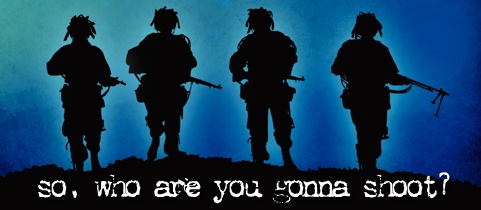Whether it’s singing “Onward Christian Soldiers,” or “I’m in the Lord’s Army,” warfare has always been a part of Christianity. With good reason. The New Testament uses military metaphors to describe the Christian life. We’ve got to be careful, of course, not to push this metaphor too far. At the same time, if we are in battle, we’ve got to understand who the enemies are. And who are the allies?
Enemies and Allies: Figuring Out Which Is Which
When we mistake enemies for allies or allies for enemies, we start doing a lot of things wrong. We spend time on the wrong projects. We waste resources. We become divisive. In essence, we persecute the church and pander to the enemy. Understanding who are enemies and allies are will help us to do the following.
- Be unified.
- Evangelize.
- Love.
- Defend the faith.
So who are the enemies and allies? Let’s define them by some negatives.
The Christian’s Enemies
- The Christian’s enemies are not necessarily people of a different political party. Politics is prone to divide people. Among Christians, however, divisions are erased, giving way to the glorious unity in Jesus Christ (Galatians 3:28). When we mistake the other political party for the enemy, we are making a serious mistake. They aren’t the enemy. Redirect your efforts.
- The Christian’s enemies are not necessarily people who are sinful or disobedient. Some Christians may tend to criticize people who don’t live squeaky-clean lifestyles. The Pharisees did this. In fact, they criticized Jesus, because He didn’t live up to their squeaky-clean standards. Jesus was not sinful. Sadly, the fact of the matter is, Christians tend to behave toward sinful people as if they were the enemy. They are not. They are in need of the righteousness of Jesus. Gay Pride paraders are not the enemy. Drunken brawlers are not the enemy. Prostitutes are not the enemy. Even a sinful Christian brother is not the enemy. (2 Thessalonians 3:14-15)
- The Christian’s enemies are not necessarily people who have different viewpoints on theological issues. Christians spend a lot of time writing books about theology. Christians also spend a lot of time writing books against those books about theology that other Christians wrote. When we become fixated on issues of theological minutiae, we run the risk of antagonizing those who don’t dot the same theological “i” or cross the same theological “t.” Let’s get something straight. The Calvinist isn’t the enemy. The Arminian isn’t the enemy. Lay down your weapons, and focus on something else for a change.
The Christian’s Allies
- Not necessarily people who share our set of standards. I happen to know some very conservative Christians who feel much more in common with Mormonism due to the shared emphasis on personal standards and modesty. To have friendships with Mormons is perfectly fine, but to ally with them in Christian unity is utterly confusing. They cannot be our allies in Gospel proclamation. A coincidental similitude of superficial standards does not constitute unity.
- Not necessarily people who share our political hot-button issues. To get back to politics, we may think that the people who get worked up about the same things that we do are automatically our allies. They may be allied on political issues, but are they allied in the work of Christ? Perhaps not. Simply because someone rabidly supports the 2nd Amendment like you do does not mean that he or she is your ally in Christian mission.
- Not necessarily our own family (Matthew 10:36). Loyalty to family is important. A realistic look at life, however, confronts us with the fact that even family members may not be allied in faith.
The Christian’s enemy is death (1 Corinthians 15:26-27), the devil (Matthew 13:39), and this world’s system (James 4:4). Christ has promised victory over them (Matthew 22:44; Luke 10:19). Meanwhile, let us not lob grenades at our allies, nor get cozy with those who are not allied in faith.
When we look at who our enemies are and who our allies are, we begin to realize that perhaps we have more allies than we thought. And when we realize that we are to love even our enemies, it makes life a whole lot simpler. There are a lot more people to love than there are to hate.

